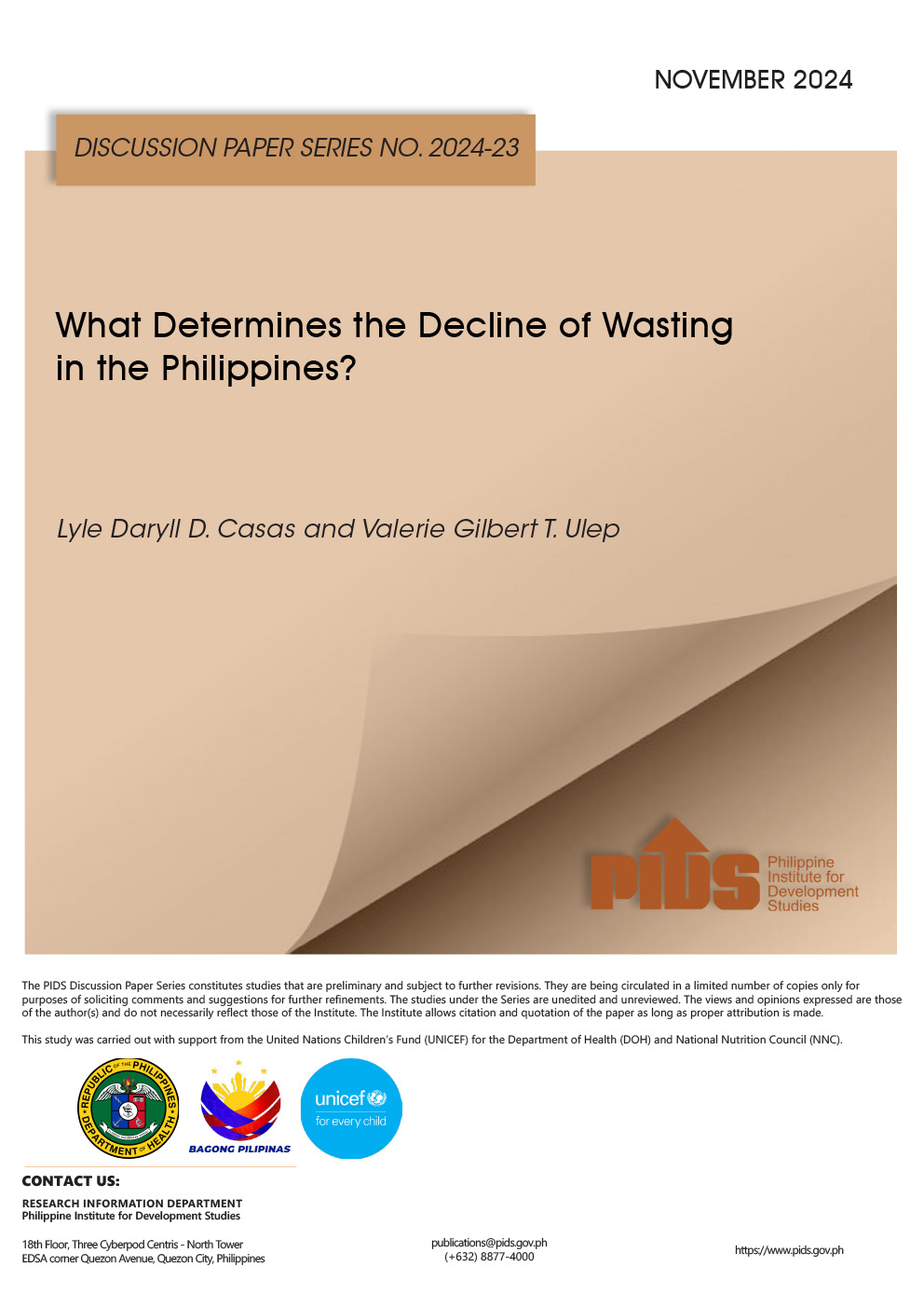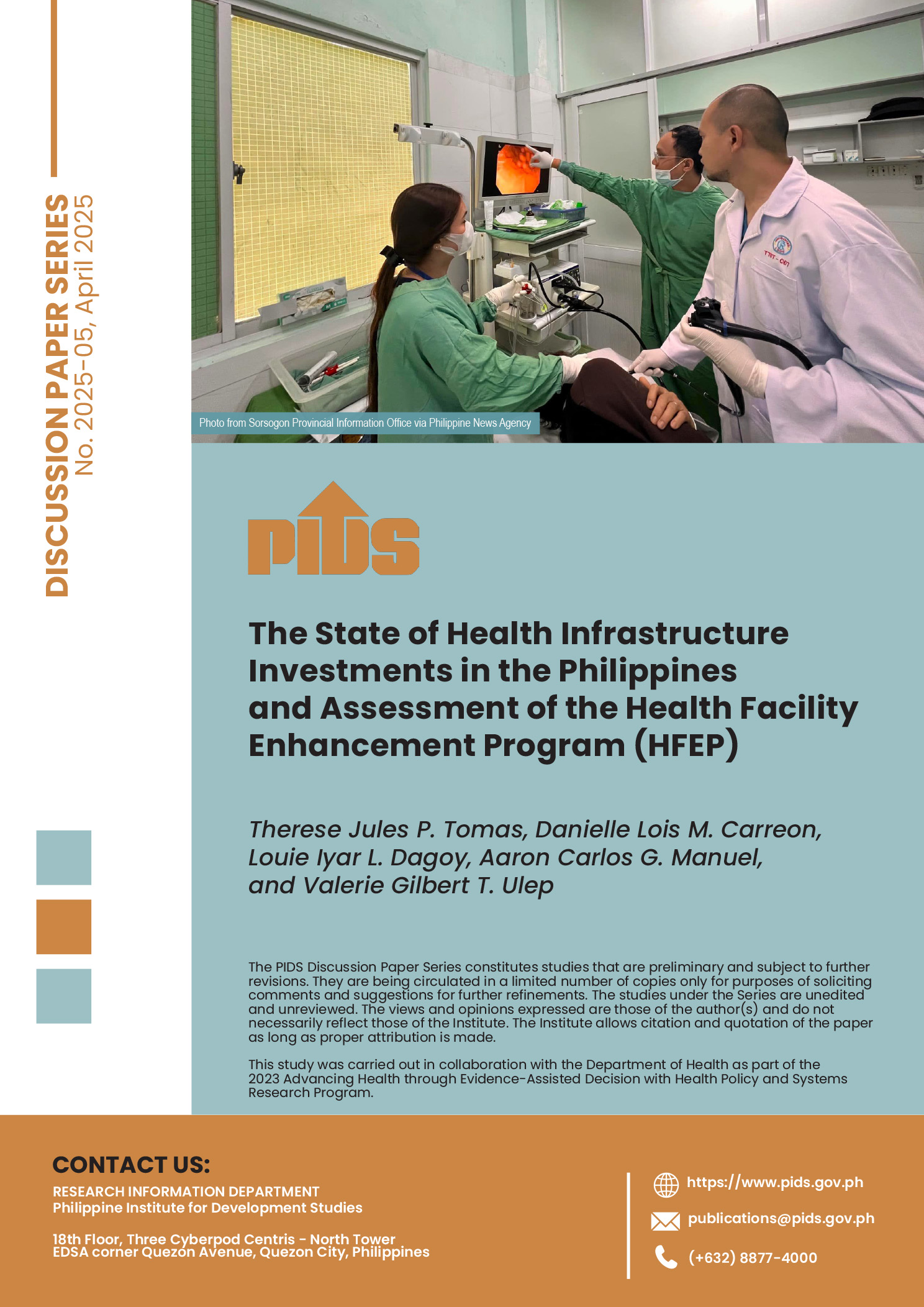A study conducted by the Philippine Institute for Development Studies (PIDS) found that inadequate and untimely access to high-quality early childcare and prenatal interventions contribute to the alarming levels of stunting among Filipino children.
The study also found that the severe underinvestment for early childhood care and development, weak institutions, and fragmented governance also hinders implementation of early childhood care development interventions.
“Behind the Slow Start: An Assessment of Early Childhood Care and Development in the Philippines” was published in support of the Second Congressional Commission on Education (EDCOM 2). The authors are Valerie Gilbert T. Ulep, Lyle Daryll D. Casas, Aaron Carols G. Manuel, John Paulo D. Mendoza, Joy Bagas, and Kim Leonard G. Dela Luna.
“EDCOM 2 welcomes the findings of the study conducted by PIDS. Our recommendations on the programmatic and legislative reforms to our education systems are based on empirical evidence from these kinds of studies,” says EDCOM 2 Executive Director Karol Mark Yee.
Low access to early education, health, and nutrition services
According to the study, participation in early education among Filipino children aged 3-4 is low, despite the implementation of legislations such as the Kindergarten Education Act, the Enhanced Basic Education Act, and the Early Years Act. “There was a drastic decline in the percentage of children aged 3-4 years old attending school during the pandemic. While it recovered to 20% in 2022, it still fell below pre-pandemic levels,” according to the authors.
The study also explained how child health outcomes are impacted by maternal and child undernutrition and exposure to infections, which directly contributes to chronic malnutrition and increased risk of mortality. Approximately 14% of Filipino women of reproductive age are undernourished and evidence shows that malnourished mothers are more likely to give birth to infants with low birth weights, resulting in both short term and long term consequences.
Furthermore, access to most basic health services including prenatal care, child immunization, postnatal care and other maternal and child services remains far from universal coverage.
Only 1 out of 4 children meet recommended energy intake
Results of the study also show that only a quarter, or 1 out of 4 Filipino children meet the recommended energy intake (REI). This finding indicates the persistent challenges in addressing nutritional needs of children, especially among aged 6-12 months from low income households.
Preliminary analysis using REI also shows no difference in terms of meeting total energy and protein intake between children who received supplementary feeding programs compared to those who did not, even after adjusting for selection bias. This finding suggests further investigation and potential adjustments to the program to ensure effectiveness in addressing the nutritional needs of children.
According to the 2022 Annual Poverty Indicator, only 23% of children benefited from school-based feeding programs. “Despite government efforts, access remains limited. We observe a higher percentage of children aged four years old receiving government feeding programs, which reflects the implementation of school feeding initiatives in daycare centers and kindergarten schools”, says Dr. Ulep, PIDS Senior Research Fellow.
To improve participation rates in early education and access to essential health and nutrition services, the study recommends the roll out of innovative financing mechanisms such as piloting public-private partnership models, and investing in science-based behavioral change communication campaigns and strategies to effectively reach and engage target audience.
“Severe underinvestment” in ECCD
Another general observation of the study is the severe underinvestment in ECCD, further aggravated by the prioritization of services with limited effects on effects on nutrition and education outcomes.
“Overall, the current supply of capital investments for ECCD in the country falls short of meeting the goal of universal access for children aged 3-34 to ECCD services. The country’s current facilities are insufficient by around 33,000 to meet the 96,000 daycare/child development centers required to meet 100% of the demand,” the report reads.
Findings also suggest that the government allocates only PHP 3,870 per child for health, significantly below the average government spending per person on health in lower- middle-income countries, which is 150 USD.
“We acknowledge the benefits of school feeding programs, but we need to start investing more deeply, and intervening, in the earlier years,” says Yee.
The study recommends increasing public spending on ECCD and investing resources in services that would dramatically affect health, nutrition, and early education outcomes by strategically allocating resources to influence ECCD spending of local governments, investing in primary health care through the implementation of the Universal Health Care Act, reevaluating the implementation framework of government led school feeding programs, and increasing the investment in health care workers to enhance their capacity to monitor mothers and children.
Governance and implementation challenges
According to the study, despite the presence of multi-sectoral governing bodies that oversee early education and health and nutrition policies, implementation of genuine multi-sectoral collaboration to ‘align’ interventions remains a daunting challenge.
“Early childhood care and education should be a shared responsibility between education stakeholders and other members of our communities. Moving forward, local government units should also have more accountability in ensuring that the benefits of ECCD programs, including health and nutrition interventions, are felt by every Filipino child,” Senator Win Gatchalian, EDCOM 2 Co-Chairperson, said.
There are observed inefficiencies in implementation of nutrition and education interventions due to overlapping roles of government agencies, lack of clarity in responsibilities resulting in poor accountability, duplication of efforts, weak coordination, and fragmented financing.
Another inherent challenge is the limited technical capacity of secretariats of these multi-sectoral bodies to effectively fulfill their strategic and stewardship roles. Administrative and program- related tasks are often prioritized over strategic technical secretariat work.
The study recommends exploring the transfer of the chairship of multi-sectoral councils to the Office of the President or a senior cabinet to remove the “co-equal dynamics” among national agencies, and the need to augment the capacity of the secretariats through organizational incentives.
“EDCOM 2 stays true to its commitment to base the Commission’s program and policy recommendations on science and evidence. We need to go the extra mile to understand the complexities of the underlying ills of our education system, so that our proposals are needs-based, responsive, feasible, and sustainable. This would include identifying the right investments for our Filipino children,” says Yee.
PIDS is one of the academic and research institutions that EDCOM 2 has partnered with to undertake research on the priority areas of the Commission, in order to pursue its mandate to conduct a comprehensive assessment of the Philippine education sector. Republic Act 11899 also designated PIDS as the research arm of the Commission, tasked to produce data-based research and analysis for policy recommendations. The PIDS study on nutrition, “Behind the Slow Start: An Assessment of Early Childhood Care and Development in the Philippines”, may be downloaded in full at https://edcom2.gov.ph/publications/.












